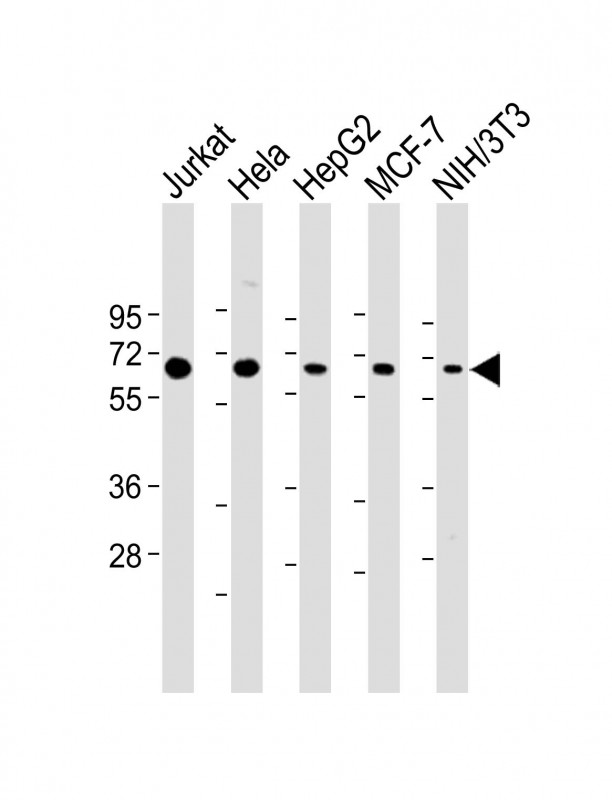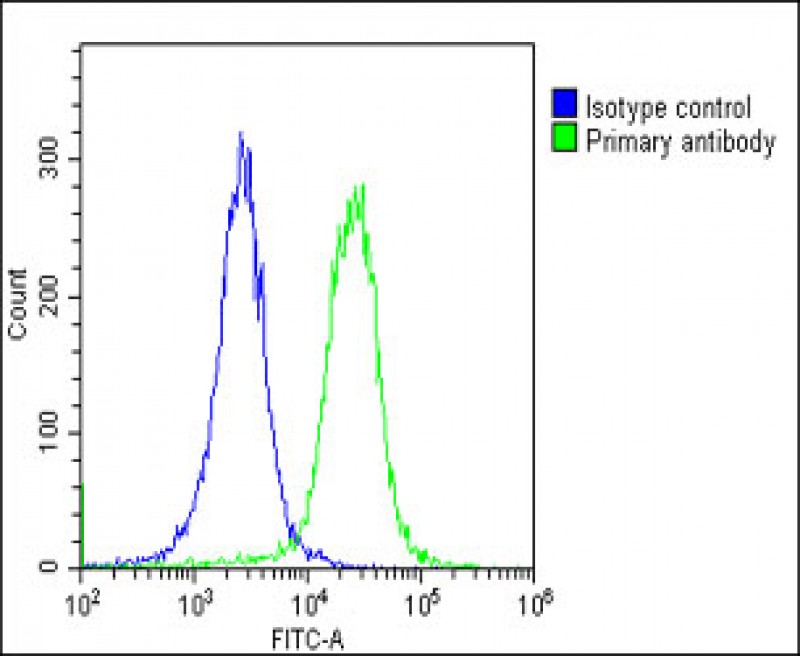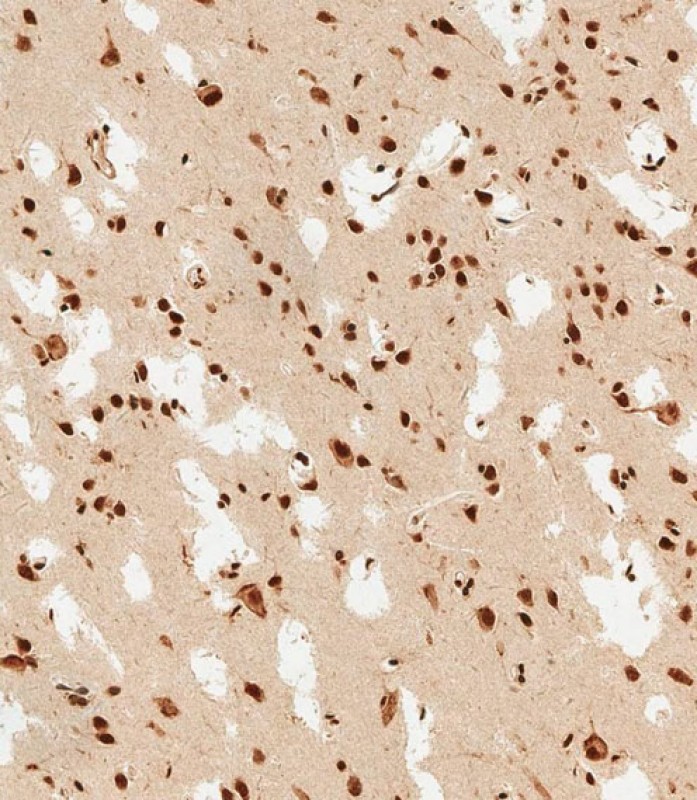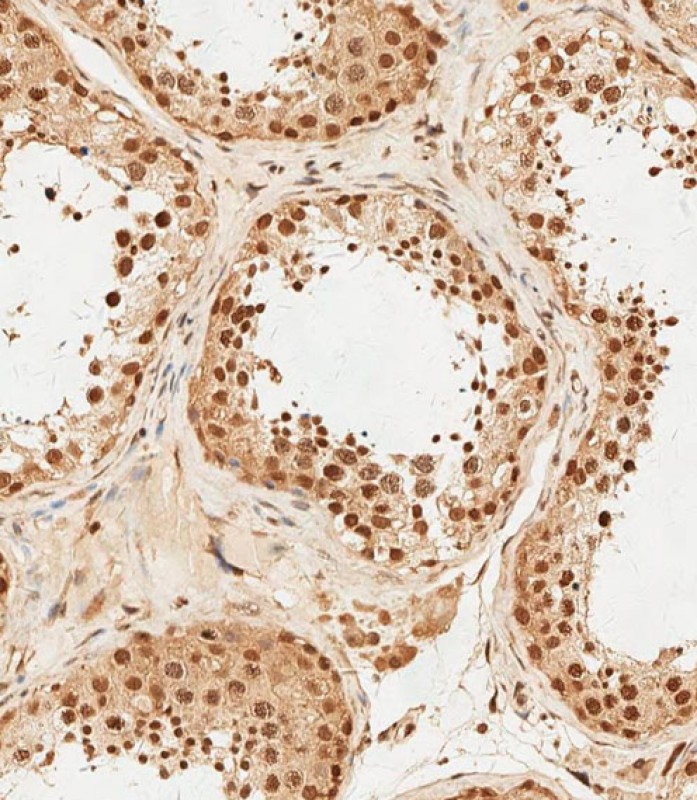



| WB | 1/2000 | Human,Mouse,Rat |
| IF | 咨询技术 | Human,Mouse,Rat |
| IHC | 1/250 | Human,Mouse,Rat |
| ICC | 技术咨询 | Human,Mouse,Rat |
| FCM | 1/25 | Human,Mouse,Rat |
| Elisa | 咨询技术 | Human,Mouse,Rat |
| Aliases | 26S proteasome non-ATPase regulatory subunit 3, 26S proteasome regulatory subunit RPN3, 26S proteasome regulatory subunit S3, Proteasome subunit p58, PSMD3 |
| Entrez GeneID | 5709 |
| WB Predicted band size | 61.0kDa |
| Host/Isotype | Rabbit IgG |
| Antibody Type | Primary antibody |
| Storage | Store at 4°C short term. Aliquot and store at -20°C long term. Avoid freeze/thaw cycles. |
| Species Reactivity | Human, Mouse |
| Immunogen | This PSMD3 antibody is generated from a rabbit immunized with a KLH conjugated synthetic peptide between 482-515 amino acids from human PSMD3. |
+ +
以下是3篇关于PSMD3抗体的参考文献概览,涵盖其在癌症机制、蛋白质相互作用及实验方法中的应用:
---
1. **标题**:*PSMD3 promotes breast cancer progression by upregulating ERK signaling*
**作者**:Li Y, et al.
**摘要**:研究通过Western blot和免疫组化(使用PSMD3特异性抗体)发现,PSMD3在乳腺癌组织中高表达,并通过激活ERK通路促进肿瘤生长和转移。抗体用于验证基因敲低后蛋白水平变化。
---
2. **标题**:*Proteasome 26S subunit PSMD3 regulates the unfolded protein response in hepatitis C virus infection*
**作者**:Wang X, et al.
**摘要**:利用PSMD3抗体进行免疫共沉淀(Co-IP)和免疫荧光实验,证明PSMD3与HCV蛋白NS5A相互作用,调控内质网应激反应,影响病毒复制及宿主细胞存活。
---
3. **标题**:*PSMD3 as a prognostic biomarker in colorectal cancer: Correlation with immune infiltration*
**作者**:Chen R, et al.
**摘要**:通过多组织微阵列结合抗PSMD3抗体分析,发现PSMD3高表达与结直肠癌患者不良预后相关,且与肿瘤微环境中CD8+ T细胞浸润减少有关,提示其免疫调控潜力。
---
**备注**:若需获取全文,建议通过PubMed或ResearchGate以标题及作者检索。部分研究可能侧重机制而非抗体开发,但均明确使用了PSMD3抗体作为实验工具。
The PSMD3 (Proteasome 26S Subunit, Non-ATPase 3) antibody is a tool used to study the 26S proteasome, a large multi-subunit complex critical for protein degradation in eukaryotic cells. PSMD3. also known as Rpn3. is a component of the 19S regulatory particle of the 26S proteasome, which recognizes ubiquitinated proteins and facilitates their ATP-dependent unfolding and translocation into the proteolytic core (20S particle). This subunit plays a role in maintaining proteasome stability and regulating substrate specificity.
Antibodies targeting PSMD3 are essential for investigating proteasome structure, function, and dynamics in cellular processes like protein quality control, cell cycle regulation, and stress responses. They are widely employed in techniques such as Western blotting, immunoprecipitation, and immunofluorescence to detect PSMD3 expression, localization, and interactions. Dysregulation of PSMD3 has been implicated in diseases including cancer, neurodegenerative disorders, and autoimmune conditions, making its study relevant for therapeutic development.
Commercial PSMD3 antibodies are typically raised in rabbits or mice using peptide immunogens derived from conserved regions of the human protein. Validation often includes testing for specificity via knockdown/knockout controls and cross-reactivity assessments. Researchers utilize these antibodies to explore proteasome dysfunction mechanisms or evaluate experimental inhibitors targeting the ubiquitin-proteasome system for disease treatment.
×